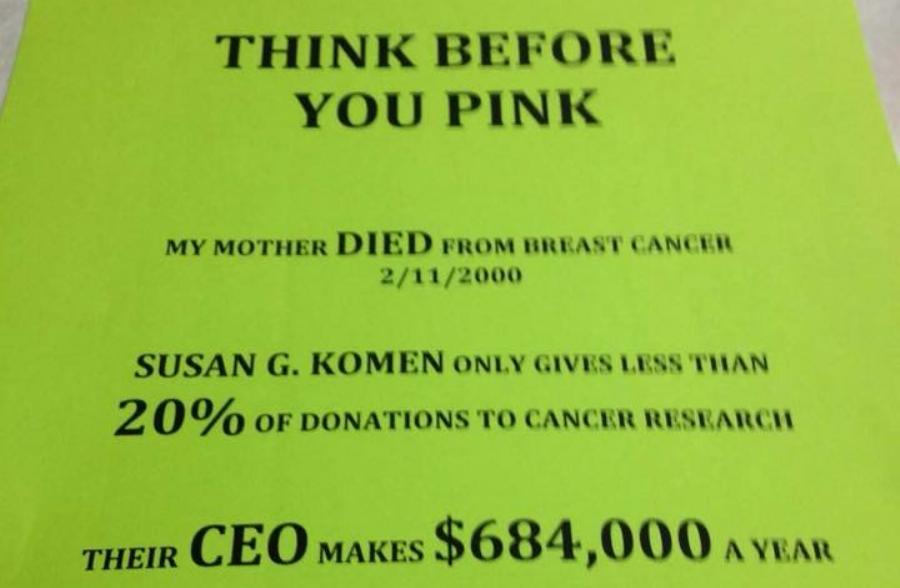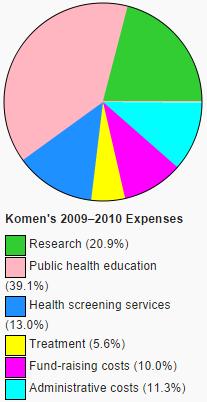
When Susan Goodman Komen died of breast cancer at the age of 33 in 1980, her younger sister, Nancy Goodman Brinker promised she would do whatever she could to help end that disease. Brinker fulfilled that promise by founding The
Brinker fulfilled a promise to her sister that she would do everything she could to help eradicate the
disease — a disease that Brinker also was diagnosed with and successfully fought."At that time, there was a stigma and shame around breast cancer," Brinker said. "You didn't talk about it. There were no 800-numbers, no Internet. Our government didn't spend much on breast cancer research. There were few major cancer centers with expertise about breast cancer. That's the world we faced when Suzy was diagnosed. It's a world I watched her suffer in, and it's a world she wanted us to change."
In 2012, Komen founder and CEO Nancy Brinker became the focus of controversy when she announced Komen would be pulling the grants the organization had been providing to Planned Parenthood for breast cancer screenings, then quickly reversed that decision. Several months later Brinker announced she would be stepping down as Komen's CEO, but the following year she was again the focus of controversy when news outlets reported that not only did she still hold her CEO position, but she had received a hefty raise to boot that brought her annual compensation up to $684,000 per year:
In early 2012, Komen announced it was pulling its grants for breast-cancer screenings from Planned Parenthood, drawing an immediate backlash from Komen supporters and abortion rights advocates. Within days, Nancy Brinker, the group’s founder and CEO, reversed the decision to defund the organization. Then, in August, Brinker announced that she would be stepping down.
But 10 months later, Brinker still holds her position and tax documents reveal that she received a
64 percent raise and now makes $684,000 a year, according to the charity’s latest available tax filing. Komen says the raise came in November 2010, prior to last year's controversy.Ken Berger, president and CEO of Charity Navigator, which evaluates and rates charities, called Brinker's salary "extremely high."
"This pay package is way outside the norm," he said. "It's about a quarter of a million dollars more than what we see for charities of this size. This is more than the head of the Red Cross is making, for an organization that is one-tenth the size of the Red Cross."
The American Red Cross had revenue of about
$3.4 billion, while Komen’s was about$340 million last year. Red Cross CEO Gail McGovern makes $500,000, according to the most recent financial documents available for the charity.
Charity Navigator's last compensation figure for Nancy Brinker was $560,896 per year, which at the time put her below Komen president Elizabeth Thompson's reported annual compensation of $606,461. In June 2013, Komen finally announced that Brinker would be stepping down as president and CEO of that organization and named
In September 2017, Paula Schneider took over as president and CEO of Komen, with compensation of $137,155 reported as of the end of the fiscal year in March 2018.
The reference to Komen's applying only 20% of donated money to breast cancer research likely comes from a pie chart displayed in the "Use of Funds" section of Wikipedia's article about

While it may have been true that breast cancer research comprised only a 21% share of Komen's program expenses (Charity Navigator puts the figure at 28.8% as of March 2018), citing that figure as a criticism of the organization reflects a common misbelief that groups dedicated to addressing particular diseases (e.g., the Muscular Dystrophy Association, the ALS Association) exist solely or primarily to fund and direct research into curing and/or preventing those diseases. This perception is inaccurate: Komen and other groups like it have goals that include delivering a wide array of services to the communities they support beyond the funding of research, such as funding educational awareness and outreach programs, providing screening and diagnostic procedures, and arranging medical treatment and home care for persons currently living with those diseases.
A more relevant metric for assessing a charity's overall financial effectiveness is the percentage of the organization's budget that is actually spent on all the programs and services the charity delivers, and in this area the Charity Navigator charity evaluation site gives Komen an
Regarding the seemingly excessively high level of CEO salaries at some charities, Charity Navigator advises that:
While there are certainly some charities that overpay their leaders, Charity Navigator's data shows that those organizations are the minority. Among the charities we've evaluated (those being mid to large-sized charities), the typical CEO's annual compensation is in the low to mid six figures. Before you make any judgments about salaries higher or lower than that range, we encourage you to keep in mind that these charities are complex organizations, with multi-million dollar budgets, hundreds of employees, and thousands of constituents. These leaders could inevitably make much more running similarly sized for-profit firms. Furthermore, when making your decision it is important to consider that it takes a certain level of professionalism to effectively run a charity and charities must offer a competitive salary if they want to attract and retain that level of leadership.

